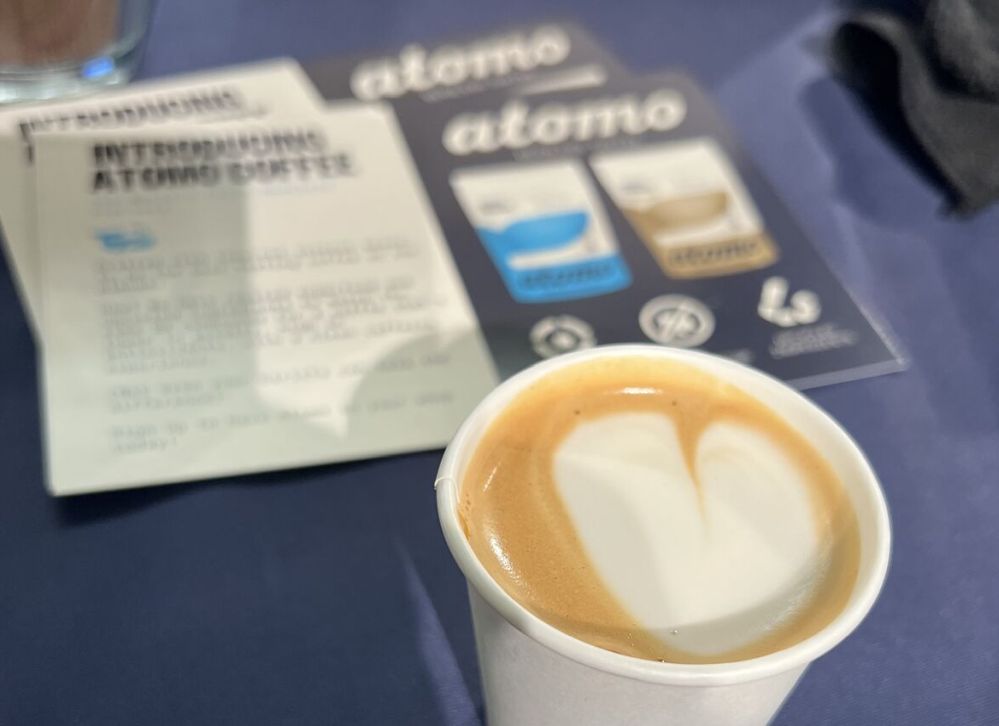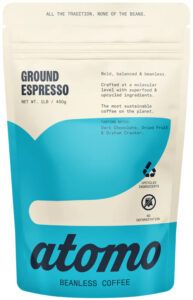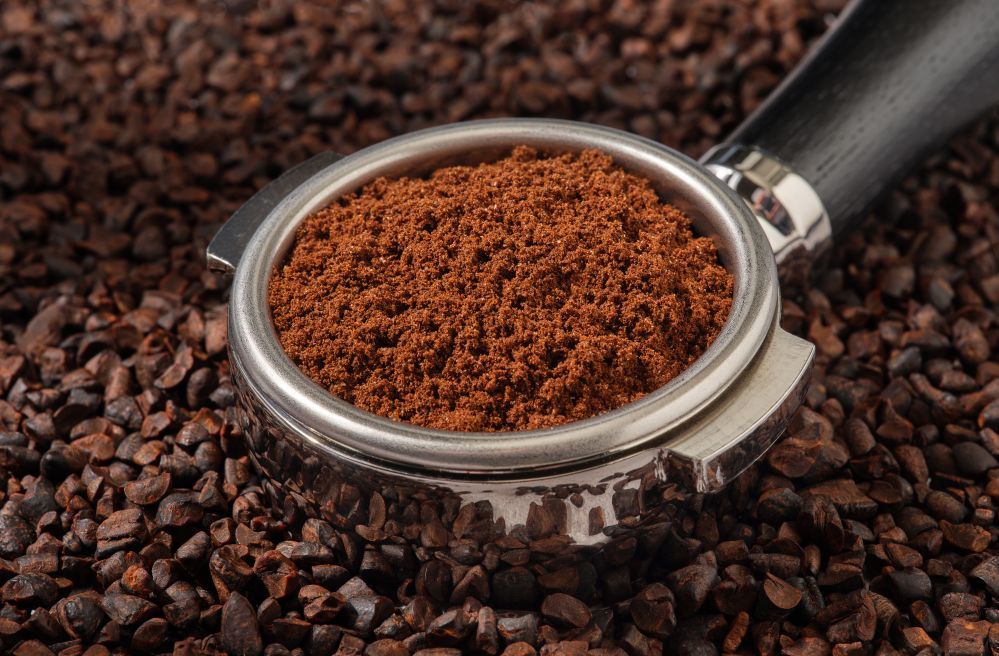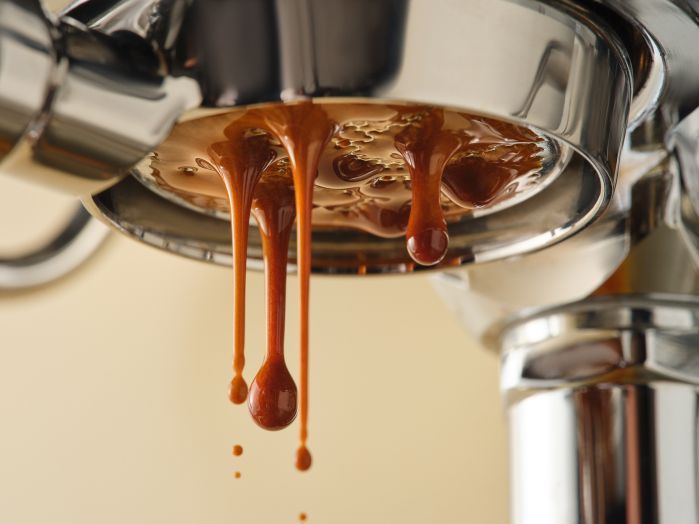[Disclosure: AgFunder, parent company to AgFunderNews, is an investor in Atomo]
Seattle-based startup Atomo—which unveiled the ‘world’s first beanless espresso’ this week at Gumption Coffee in New York—is gearing up to open a facility in March 2024 that will be able to produce four million pounds of ground ‘coffee’ a year made from upcycled date pits (equivalent to around 80 million cups).
According to Atomo cofounder and CEO Andy Kleitsch, the aim is to “show some early traction across hundreds of coffee shops and then use that momentum to raise additional funds to build a factory that can produce 40 million pounds a year.”
The startup, which is backed by $51.6 million from investors including S2G Ventures, AgFunder, and Horizons Ventures, has “had several strategics reach out to us in the last few months,” adds Kleitsch. “I can’t say more now, but there is going to be an announcement coming up in the next couple of weeks.”

Pivot to grounds
Founded in 2019 by Kleitsch and microbiologist Dr. Jarret Stopforth, Atomo originally focused on making beanless cold brew in 8oz cans. However, it has recently changed tack to focus on grounds, explains Kleitsch.
“For us to scale cold brew it looked like we were going to have to build custom factories using equipment that you don’t get in traditional factories,” he tells AgFunderNews. “But thanks to a recent breakthrough with the grounds side of the business, we can now send our grounds to any cold brew factory and they can use existing equipment to make it.”
The new grounds formulation—showcased this week in New York—is initially being targeted at coffee shops, and contains date seeds, ramon seeds, sunflower seed extract, fructose, pea protein, millet, lemon, guava, defatted fenugreek seeds, caffeine from green tea, and baking soda, delivering an “incredible” espresso with the “mouthfeel, taste, and aroma” of coffee, claims Kleitsch.
‘The 2050 problem’
While the introduction of new ingredients such as ramon seeds (also known as maya nuts) sounds like the company has added a layer of complexity to its ingredients sourcing, Kleitsch says the new formula and the ability to supply grounds has been a “game changer” for Atomo.
“We’ve been approached by almost every major coffee company in the world because of what we call ‘the 2050 problem,’ that by 2050 they’re going to have considerable supply chain problems with coffee. So part of our long term plan is to create a platform which is adaptable enough that we could use ingredients from different regions that would still work in the formula.
“If we know what it is in ramon seeds that’s contributing to the flavor, can we source that from another ingredient instead? We’re trying new ingredients every day.”
“We look at all the compounds in green coffee beans and then look at the reactions during roasting. And our journey has been trying to replicate that process.”
He adds: “We take the date pits and infuse them in a marinade. The reaction—what we call the cross Maillard reaction—generates the coffee compounds we’re searching for.”
Is there a market for beanless coffee?

But while Atomo and other startups in the ‘beanless’ coffee space are attempting to solve a structural problem in the coffee industry (demand exceeds supply and the supply is increasingly threatened), are they solving an immediate consumer problem?
Put another way, while the world’s coffee giants are acutely aware that by 2050, 50% less arable land may be suited to growing Arabica, most coffee drinkers are blissfully unaware that their cup of Morning Joe is under threat. Given that disconnect, could Atomo’s premium alternative have limited appeal?
It’s a fair point, says Kleitsch, who acknowledges that no one is going to buy beanless coffee “unless it tastes as good as, or better than, the real thing.” But Atomo is also offering some immediate consumer benefits in the form of customizable caffeine content, and a smoother, less acidic cup, which consumers prefer in blind taste tests, he says.
“What we’re finding is that consumers are just enjoying the taste. We have created something that’s less bitter with more chocolate, dried fruit and graham cracker notes. It’s very drinkable. It’s very approachable, and you can dial up or down the caffeine level. So for the double espresso shot it’s 100mg per serving, but we’re also getting requests for zero caffeine.”
Right now, he says, “the target audience we’re going after is the alternative milk drinker. A person that has made dietary changes for environmental or health reasons. But our number one request is a coffee that has absolutely no caffeine but delivers all the coffee experience. We put together a ‘Coffee Council’ of eight professionals in the coffee industry with decades of experience, and when they tried one of our coffees and we told them it was caffeine-free, their minds exploded. They couldn’t believe it.”
At this early stage, Atomo is charging coffee shops a hefty $20.99 a pound (vs $10-14lb for comparable coffee products) but has “not had any pushback,” claims Kleitsch.
The long-term vision
So what’s the long-term vision for Atomo?
For the next 12 months or so, says Kleitsch, Atomo will be working with coffee shops “to deliver a high-end premium experience in a cafe where consumers can have a really curated experience.”
But he also has grander ambitions: “If we’re going to have any impact on the planet [and presumably deliver returns for investors], we have to do this at scale, which means we have to work with some of the largest coffee brands on the planet,” says Kleitsch.
“We’ve had interest from companies interested in taking the Atomo brand into Asia, but there is also plenty of opportunity for us to supply large coffee companies with great tasting coffee, just from a different source, so it could be a [b2b branded ingredients] collaboration with ‘Atomo inside.’
“Our ultimate desire is to replicate every coffee experience from cold brew to espresso to packaged coffee to pods.”

The competitive set
Asked about other players in the beanless coffee space, from Minus Coffee and Voyage Foods (using upcycled plant-based ingredients like Atomo) to biotech startups such as Stem and California Cultured (growing ‘real’ coffee from plant cell culture), Kleitsch insists there’s room in the market for multiple approaches.
“The market is huge so there is plenty of room for alternative solutions, although we believe that we are the furthest along in replicating coffee. We wish our competitors well but we’re also confident that we have the best solution.”





